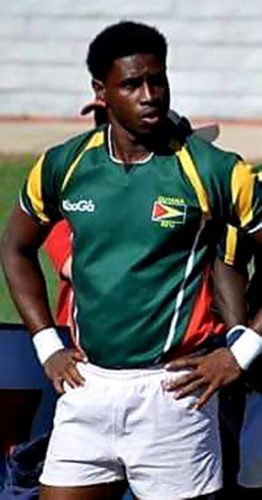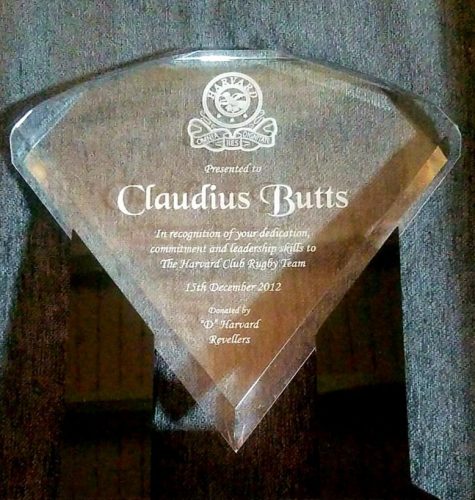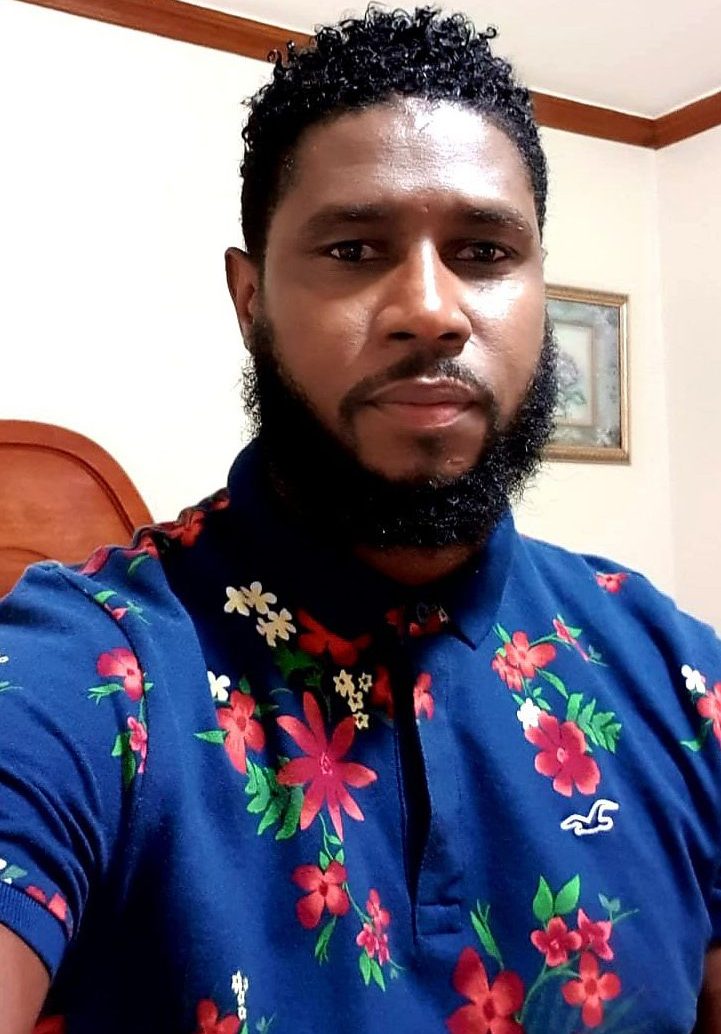After successfully captaining the national rugby football team, Guyana Jaguars aka The Green Machine, to a seven-year winning streak in the region from 2005, Claudius Butts, 39, the Guyana Rugby Football Union’s (GRFU) coach of the national sevens side says, he is helping to develop the young players to bring back respectability to Guyana’s rugby in the region.
“The last time Guyana won a major tournament was in 2015. Then we lost twice in the finals to Jamaica in 2018. I aim to get them to the level of the team I once captained and then to surpass that. It is going to be extremely difficult but I am willing to do it with support,” Butts told Stabroek Weekend in a recent interview.
“We’ve set up a youth programme in which we are identifying some of the better under-19 players to undertake a series of technical work and classroom sessions to develop their rugby skills. The aim is to produce a continuous flow of players going into the national sevens programme. We aim to train the young players to play competitively.”

Butts is the holder of levels one and two coaching certificates from World Rugby and he holds others certificates for youth development coaching. He works with a team that includes Australia-based Guyanese Kevin McKenzie as the technical director, Walter George as assistant coach/assistant technical director and Ryan Gonsalves and Ryan Dey as managers.
Butts, a former student of St John’s College, spent his early childhood in Georgetown before the family moved to Nandy Park, East Bank Demerara where he now resides. At high school he was more interested in track and field and basketball. Rugby was nowhere on his radar.
In 2000, when he was 16 years old, he and some of his friends learned that they could use the Michael Parris Gym in the National Park free of cost if they played one of the sports under the Guyana Olympic Associa-tion. Rugby was one such sport and it was played close by in the National Park.
“We joined the Yamaha Caribs Rugby Football Club but my friends left shortly after. I stayed. I’d learnt that in a few months’ time the under-19 rugby team was to be selected and that was motivation. I was still at St John’s College at the beginning of my rugby career,” he recalled.
To make the Caribs team, from Monday to Friday, Butts got up at about 4 am, had breakfast, took a minibus from Nandy Park to Stabroek Market and then ran to the National Park for gym training under fitness coach Barrington Brown.
“After that training session, I’d take a shower in the gym, and then go to school, get my school work done, then go back to the National Park for rugby training under Caribs coach Sherlock Solomon in the afternoons before going home. I was self-driven to put in the hard work to make the club’s team,” he said.
At that time, too, he said, a lot of competitive club rugby was played in Georgetown. “I wanted to perform well at the club level to be called for the national team. I was in high school when I was called up to play for the youth and senior teams. I was very excited knowing I had put in the hard work and I was rewarded. Words cannot describe that feeling when I was first called up for the under-19 team,” he added.

Butts was 17 when he made the youth and national teams. His first regional tournament was the Caribbean Under-19 Championship in Guadeloupe in 2001 and that same year at the Rugby World Cup 15s Qualifiers in the Cayman Islands.
“When I made the senior team, I was extremely excited to know that as a youth player I was going to play with some of our best local senior players like Terry Brathwaite, Conrad Arjoon and Mugabe Hunte,” he recalled. “Hunte was considered the best winger during his run on the national side and he was also a West Indies player. I subsequently played in the same position.”
Recalling his first international tournament, he said the first game was against Bermuda, which was one of the top 15s teams in the region along with Trinidad and Tobago. Bermuda was the first runner-up in that tournament. The second game was against Jamaica.
“We took sixth place in that qualifier. To be a part of the senior team at that young age was remarkable. I got the first opportunity to see the game of rugby in the Caribbean at that level,” he related.
Captaincy
When Butts started playing, the GRFU had embarked on a youth development programme as part of its rebuilding process and most of the players who he captained came through it.
“Our youth coach was Laurie Adonis and our senior coach was Solomon,” he noted.
His first stint as captain for the senior national team was in 2007 and that same year he was also named the West Indies captain. He captained the Guyana side from 2007 over a seven-year period and the team won most if not all the matches under his captaincy.
“To begin, we went through a series of defeats by simple margins initially in the LIAT Sevens in Trinidad and Tobago (TT) but we had a vibrant youthful team from different clubs,” he said.

Butts, Gonsalves, Theodore Henry, Albert La Rose, McKenzie and Richard Staglon were the core players the national team had been built around.
“Our winning ways did not come easily. Solomon, as the head coach, put us through some difficult training sessions with a lot of fitness and strength work and indoor sessions. At the time, we didn’t have social media or YouTube on which we could stream or see up-to-date rugby. We relied on VHS cassettes sent by coaches or contacts from overseas,” he recalled.
The GRFU took the team to the LIAT tournament in TT to gain some international exposure to teams from top playing nations like England, South Africa, Australia, Fiji, Tonga, Samoa and New Zealand.
“The union took us to these tournaments to help us to develop our individual and team’s skills thereby developing rugby in Guyana,” he noted.
Seven-year winning streak
In 2005, Guyana men’s senior team lost to TT in the semi-finals in the Caribbean sevens. “In 2006, we won our first Caribbean title. We played Jamaica in the finals. In that 2006 tournament we were unbeaten. Not a single team scored a try against us. We have held that record. After 30 or more games another team scored on us. We played over 50 consecutive games without being defeated. We were on a roll. We had good size and speed. We were a very talented side. We were on that seven-year winning streak,” he related.
Officially named the Guyana Jaguars, the sevens team was by then nicknamed, The Green Machine.
“Our team was very fortunate to have at least four players on the West Indies team every year who played in the International Rugby Board World Seven Series. They were, myself, Albert La Rose aka Coco, Kevin McKenzie and Theodore Henry. This meant that we brought some things back into our national team to get us to the international level,” he said.
“When the format had changed and World Cup Rugby was reintroduced into the Olympics, it was easier for Guyana to get to the Commonwealth Games and other games because we had four players who played internationally at the time.”
Butts played in both formats of the game, at the sevens and at the 15s level.
“In 2005, one of the major upsets at the time was that Guyana had not beaten T&T in any format of the game for over 20 years. In 2005, in the regional tournament, we were able to get past them in our first match. The tournament was held in Guyana and we went on to win that tournament. I actually scored two tries in that winning match.
“It is very difficult in international matches to break the defensive line in a 15s match, much less scoring with screaming fans. As you get past the defensive you have to remain focused. When you get over that touch line you get that very great feeling of achievement.”
Butts scored tries against some of the best teams in the world including Fiji, Tonga, Australia and New Zealand.
Among the many tournaments he has played in were the Punta Del Este Rugby Football Tournament in Uruguay, the IRB World Seven Series in the USA for several years. He also played in the World Series in Hong Kong. In 2010 he took part in the Commonwealth Games in New Delhi, India. “I captained that first Commonwealth Games we took part in as a nation.”
In 2010, Butts also captained the national side at the Central American and Caribbean Games in 2010 defeating Jamaica 31-7 to win the gold medal. “It is the only team sport in which Guyana has won a medal to date at the CAC Games.”
The first hemispheric 15s win was in Atlanta in 2010. “That was the North Zone versus the South Zone in the North American Caribbean Rugby Association 15s tournament. Guyana had beaten the Southern Caribbean’s teams to represent the Southern Caribbean in the tournament, and the USA South team was the champion of the Northern Caribbean.
“That was one of the most electrifying games I’ve captained. In the first 40 minutes, the USA had the better of us. At the start of the second half, I scored a try. That gave us some momentum. We settled and we started to play our brand of rugby. We were level at the end of game time and we went to sudden death in double overtime. We won that game through determination,” he said.
“I recall seeing the fight in every player. It was the first time we were that close to winning the championship. We spoke about not giving up in the dressing room until the final whistle. Fitness helped us to get over that hurdle. It was also difficult to go into the US and win on their home turf to get our first title. That was our first finals in a 15s hemispheric tournament. We had never won a 15s tournament of that nature for Guyana before.”
Winning, he said, was a rewarding experience. “You’re not playing only for yourself. You’re playing for club, country or region. On days when your body is still aching from the day before, you still find that mental toughness to go again. The path to the top could be difficult, and when you make winning a part of your life, you have to work harder to stay on top.”
In 2008 Butts was named the National Sports Commission’s runner-up Sportsman of the Year to cricketer Shivnarine Chanderpaul.
“During my term as captain, our team got the sports team of the year award in 2008 and the GRFU got the association of the year award. Subsequently for multiple years we won the sports team and sports association of the year awards,” he said.
He said that for a sports team that did so much to put Guyana on rugby’s world map and for sports in Guyana they were not recognised or given anything by any of the governments in power to mark their achievements.
“I’m still extremely disappointed that our players were not recognised by the various administrations. I really think we should have been awarded something tangible for our efforts, especially during that period when no other sports teams were doing much for Guyana. We were out there, flying the Golden Arrowhead at the international level. I think the sports administrators failed us,” he said.
WI/TT experience
At the West Indies level, Butts said, training was “very difficult” because it consisted of much strength, conditioning and fitness that included lots of 150, 200, 400 and 800 meters sprints.”
While he played sevens at the international level he played 15s at the regional and hemispheric levels. The year after he was selected as a West Indies player, he was named the captain of the team.
“At first it was a bit challenging. We had players from different countries and different cultural backgrounds. I had to get to know them to find ways to get maximum performance out of them. That experience was a wonderful one. Over the years with West Indies rugby I was able to put together some very good teams and we actually were very competitive with the big countries like New Zealand, Fiji etc. At that time our team was a very young one,” he noted.
Butts spent 11 years in TT, prior to Covid-19, when he was stuck in Guyana and could not return, where he was coaching the Harvard Sports Club’s rugby team.
“Trinidad has more competitive rugby and many more clubs than Guyana. A lot of international players also play for various clubs. I joined Harvard which had a rugby team that wasn’t doing well at the time. I helped to build Harvard’s rugby. The year after I joined them I became the captain. I took a bunch of young players and transferred the Harvard team into one of the top teams in T&T.”
Butts also coached rugby at Belmont Intermediate Boys School which acted as a feeder school for the Harvard team.
“In my time at Belmont, I transformed the school’s team to one of the best schools’ rugby teams in T&T and from which we got young players into the Harvard Under-19 team and some into the T&T under-19 team. Then Covid-19 came and put a halt to my movements,” he recalled.






